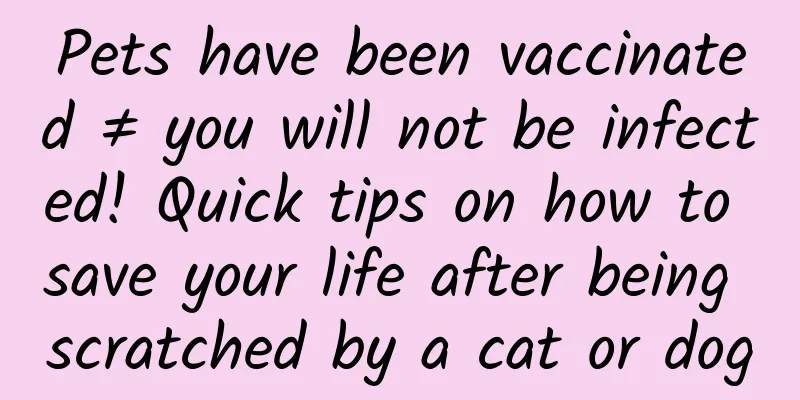Pets have been vaccinated ≠ you will not be infected! Quick tips on how to save your life after being scratched by a cat or dog

|
Pets play an increasingly important role in our lives. They are not only lovely companions, but also members of the family. However, many pet owners may not know that even if their pets have been vaccinated, they are still at risk of contracting diseases when scratched by cats and dogs. Therefore, it is important to know the correct way to deal with scratches by pets. 1. Why are pets still at risk of infection after vaccination? Vaccines have limited protection : Although vaccines can greatly reduce the risk of pets contracting certain diseases, they do not provide 100% protection. Over time, the protective power of vaccines may gradually weaken. Vaccine types and coverage : Pet vaccines are mainly targeted at specific diseases, such as rabies, canine distemper, feline distemper, etc. However, pets may be exposed to other pathogens that are not covered by vaccines, resulting in infection. Individual differences among pets : Each pet’s immune system is different, and some pets may have a weaker response to vaccines and fail to produce sufficient antibodies. 2. Life-saving operations after being scratched by cats and dogs 1. Wound management Rinse the wound immediately : After being scratched by a cat or dog, you should immediately rinse the wound with soapy water (or other weak alkaline detergents) and running water alternately for at least 15 minutes. Running water can effectively remove viruses and bacteria in the wound. Debridement and disinfection : After flushing, wash the wound with saline, and then apply disinfectants such as iodine, benzalkonium chloride or quaternary ammonium salts to the wound. If the wound has a lot of broken tissue, debridement should be performed first. 2. Seek medical treatment promptly Assess exposure levels : According to the guidance of the National Center for Disease Control and Prevention, exposure levels are divided into Level I, Level II and Level III. Level Ⅰ exposure : accidental contact with animals or licking of intact skin; only cleaning of the contact area is required, no vaccination is required. Level II exposure : Exposed skin is bitten or slightly scratched, and the wound needs to be treated as soon as possible and rabies vaccine should be administered. Level III exposure : Multiple penetrating bites, scratches or open wounds, etc., require immediate treatment at the hospital, and rabies vaccination and passive immunization preparations should be received under the guidance of a doctor. Vaccination : In addition to the case of intact skin being licked, even if there is no visible bleeding, as long as there is a slight scratch or abrasion, rabies vaccination is required. If the broken skin is licked, the open wound, and the mucous membrane is contaminated by saliva or tissue, vaccination is also required. Once rabies occurs, the mortality rate is almost 100%, so timely vaccination is crucial. Professional judgment : If you are unable to judge the severity of the wound and whether vaccination is needed, you should go to a qualified rabies exposure prevention and treatment clinic as soon as possible for a professional to make a judgment. 3. Observe symptoms After treating the wound, pay attention to whether the wound has redness, swelling, pus or other abnormal phenomena in the next few hours and days. If these symptoms occur, they may be signs of infection and you should see a doctor immediately. 3. Preventive measures Vaccinate your pet regularly : Vaccinating your pet regularly is an important measure to prevent diseases. This not only protects your pet's health, but also reduces the risk of cross-infection between humans and pets. Keep your pet healthy : Ensuring your pet's health is key to preventing disease. Take your pet for regular checkups to identify and treat potential health problems. Treat pets properly : Educate family members and children on how to treat pets properly and avoid excessively teasing or scaring pets to reduce the risk of scratches and bites. IV. Conclusion Just because your pet has been vaccinated doesn't mean you won't get sick. After being scratched by a cat or dog, the right treatment is crucial. Cleaning the wound promptly, disinfecting it, assessing the level of exposure, and vaccinating it are key steps to prevent diseases such as rabies. At the same time, regularly vaccinating your pet, keeping your pet healthy, and getting along with your pet correctly are also important measures to prevent disease. Through these methods, we can better protect the health of ourselves and our families and enjoy the good time with our pets. |
>>: Parents gave their convulsing child boiled water and sent him directly to the ICU
Recommend
What causes blood streaks in early pregnancy?
In the early stages of pregnancy, the fetus is un...
After breaking up with her boyfriend, a woman was so sad that her heart was "broken"! No kidding, serious cases may cause sudden death...
Expert in this article: Yang Chao, MD, attending ...
Methods for women to nourish kidney and blood
Women actually also need to nourish the kidneys a...
Complete guide to female enema: steps and processes
Enema is a very common medical technique. Enema i...
Why did it hurt so much the first time?
Transforming from a girl to a woman is a huge cha...
I took the medicine within 28 days of pregnancy.
How long after pregnancy does the body of a pregn...
How to improve skin absorption capacity
Girls all love beauty, especially when it comes t...
How to clean a smart toilet? What to do if the remote control of a smart toilet fails
Smart toilets provide multiple functions for huma...
People with high blood pressure have to do a lot of tests before taking medicine. Is it for "making money" or is it really necessary?
A friend left a message to Huazi, saying that his...
Why does the pregnant woman feel pain around the eyes when squeezing her belly?
When a woman is pregnant, she should pay attentio...
Minimally invasive treatment of breast nodules
Breast diseases have a great impact on many women...
How to treat polyfollicular ovary
Polyfollicular ovary is a female disease. Today&#...
How to get the flu vaccine this year? All your questions are here
As the hot summer passes and the weather gets coo...
Will there be any reaction in one or two days of pregnancy?
A woman’s pregnancy is a big event for the whole ...
What does safe period mean?
Many people don’t understand the safe period. So ...









